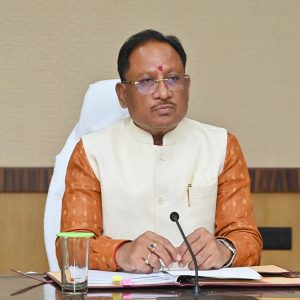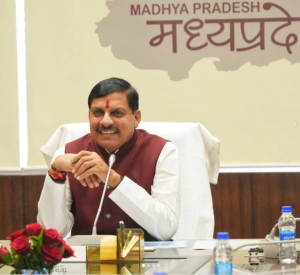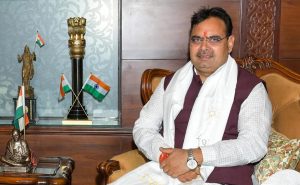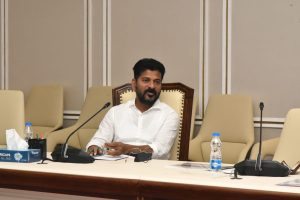Chhattisgarh – Vishnu Deo Sai: The First Adivasi Chief Minister of the State
In the recent Assembly election campaign, Union Home Minister Amit Shah spoke at a public rally in north Chhattisgarh’s Kunkuri Assembly constituency, urging people to vote for BJP tribal leader Vishnu Deo Sai. Shah promised the crowd, “You make him an MLA, we will make him a big man.”

After the BJP’s impressive victory over the incumbent Congress, 59-year-old Vishnu Deo Sai became the first tribal Chief Minister of Chhattisgarh, a state where Adivasi communities make up one-third of the population.
Sai won by defeating the sitting Congress MLA, Udit Minj, with a margin of over 25,000 votes in the tribal-dominated Surguja region, where the BJP secured all 14 seats. His appointment marks a generational shift in the BJP, replacing 71-year-old Raman Singh, a leader from the Vajpayee and Advani era, who served three consecutive terms as the state’s Chief Minister.
After being declared the leader of BJP’s legislative party in Raipur, Sai said, “Humility should not be considered a weakness. I consider it my strength, and I will try to remain humble throughout my life.”
Chhattisgarh observers describe Sai as a “no-nonsense” and “forthright person,” a grassroots leader who rose through panchayat bodies. With a class X education, he comes from a political family, and his grandfather and uncle were involved in politics.
According to the Association for Democratic Reforms (ADR) and Chhattisgarh Election Watch, Sai has total assets worth over Rs.3.8 crore and over Rs.65 lakh in liabilities.
As a seasoned politician, Sai brings ministerial experience and organizational skills. He served as the Union Minister of State for Steel, Labour, and Employment in the first Narendra Modi government. Starting as a Panch in 1989, Sai entered the Assembly in 1990 and served as Chhattisgarh’s BJP chief three times since 2006.
Observers foresee challenges for the Sai government in tribal areas, balancing the coexistence of polarized tribal groups and addressing issues facing forest-dwelling communities due to Maoist insurgency and expanding mining projects.
Madhya Pradesh – Mohan Yadav: Local Leader and Advocate of Hindutva Ideals
Mohan Yadav, the recently elected Chief Minister of Madhya Pradesh, came as a surprise choice from the BJP’s top leadership, considering the presence of several senior contenders. He doesn’t quite match the political stature of figures like the outgoing Chief Minister Shivraj Singh Chouhan or Uma Bharti, both former BJP Chief Ministers in Madhya Pradesh with significant political backgrounds.

Yadav may not have harbored such aspirations until his name was announced for the post by the BJP’s central election observer, Haryana Chief Minister Manohar Lal Khattar. The BJP’s Madhya Pradesh unit has often been criticized for having more leaders than active members, with some Union ministers wielding more influence than Yadav in their respective areas. Despite figures like V.D. Sharma, Narottam Mishra, and Narendra Singh Tomar being considered as potential replacements for Shivraj Singh Chouhan, Yadav’s appointment came as a surprise to both contenders and the wider party.
Two factors seem to have played a role in Yadav’s favor. First, he is said to have close ties to the RSS, the ideological fountainhead of the BJP. Second, belonging to the Other Backward Classes (OBC) community became crucial in the current political climate, with other parties focusing on OBCs and Rahul Gandhi advocating for a caste census.
Yadav, with a background as the president of the Madhya Pradesh Wrestling Association and the vice-president of the Madhya Pradesh Olympic Association, has faced controversies in the past, including an accusation of disrespecting Hindu religious beliefs. His elevation is seen as part of the BJP’s strategy to emphasize religious agendas in the upcoming 2024 Lok Sabha elections.
Starting his political journey as an ABVP member, Yadav’s early activism and leadership roles were mainly in Ujjain district. He joined the RSS in 1993-95 and steadily climbed the party ladder, holding various positions within the BJP and associated wings. Unlike his predecessor Chouhan, who had an impressive portfolio, Yadav became an MLA in 2013 and retained his seat in subsequent elections. He served as the Cabinet Minister for Higher Education in 2020 in the Chouhan government.
Rajasthan – Bhajan Lal Sharma: An Experienced Leader of Sangh Tradition
Putting aside the political aspirations of several Chief Minister hopefuls, the BJP chose Bhajan Lal Sharma, a 56-year-old first-time legislator from Sanganer with a 34-year association with the Sangh, to be the Chief Minister of Rajasthan. Sharma won against his closest rival, Pushpendra Bharadwaj of the Congress, in a direct contest with a margin of 48,081 votes.

After Hardeo Joshi, a Brahmin, held the post for three terms, this marked the second time in the history of the State that a Brahmin was selected to lead Rajasthan. Sharma’s selection was a strategic decision, influenced by realpolitik and the BJP’s caste considerations. He also had the confidence of the Sangh, unlike Vasundhara Raje.
Sharma’s appointment was not accidental. Like the Chief Minister candidates of the other two Hindi heartland States, the party clearly preferred a person with organizational loyalty if not administrative experience.
Another factor was that Sharma did not openly align with any “camp” yet. Except for a slight deviation in his politics in 2003, Sharma has been predominantly a Sangh loyalist. Originally from Atari village in Bharatpur district’s Nadbai tehsil, Sharma joined the ABVP in school itself. He was made district co-convener as well. In 1991, he assumed leadership of the district division of the Bharatiya Janata Party’s student wing, Bharatiya Janata Yuva Morcha, a position he held on three occasions. He served as a member of the panchayat samiti and subsequently ran for and triumphed in the sarpanch elections at the age of 27.
Armed with a Masters in Political Science from Rajasthan University, Sharma quietly worked his way up behind the scenes as many opportunities came his way to test his ideological loyalty. In 1990, while participating in the ABVP’s Kashmir Bachao Andolan, he was jailed in Udhampur along with other activists, and in 1992, he was arrested again in the Ram Janmabhoomi movement.
In 2003, he got upset with his political party for a short time and joined a group led by BJP rebel Devi Singh Bhati called Samajik Nyaya Manch. Bhati, who had big goals himself, was upset about reservations for the Jat community, so he started his own group. Sharma ran for elections under the SNM group in Nadbai but lost badly, and almost everyone else from SNM lost too.
After a few years, the Samajik Nyaya Manch stopped existing, and Sharma went back to the BJP. He became the BJP’s district president and later the State vice-president. He then moved to the headquarters in Jaipur and became a general secretary. He kept this position until he was chosen as a candidate for the Sanganer area.
Just like in Madhya Pradesh and Chhattisgarh, the main leadership approved the names of two Deputy Chief Ministers, Diya Kumari and Prem Chand Bairwa, along with Sharma’s name. They wanted a “collective leadership” approach and a team that represented different caste interests.
Telangana – Anumula Revanth Reddy: First Congress CM of the Youngest State
Anumula Revanth Reddy, aged 54, has achieved the distinction of becoming the youngest Chief Minister of Telangana and the first from the Congress party. His energetic campaign played a pivotal role in the party’s decisive triumph over the ruling BRS, culminating in his swearing-in on December 7.

Despite contenders like Mallu Bhatti Vikramarka and N. Uttam Kumar Reddy vying for the top position, Reddy emerged as the clear preference of the Congress leadership. Although some resistance surfaced within the party, Reddy garnered significant support, including endorsement from Karnataka’s influential Deputy Chief Minister, D.K. Shivakumar. His close association with Rahul Gandhi during and after the Bharat Jodo Yatra further solidified his standing.
Reddy’s affiliation with the politically influential Reddy community (43 out of 119 MLAs) also played a pivotal role in his favor. However, his past political affiliations became a point of contention during the election campaign. Reddy, who started his political journey with the right-wing ABVP, had brief associations with the TRS (BRS’ earlier avatar) before joining the TDP. His switch to the TDP helped him secure Assembly seats in 2009 and 2014 in undivided Andhra Pradesh.
Despite the tarnished image of the TDP due to a 2015 cash-for-votes scandal, it did not significantly impact Reddy’s electoral prospects. He joined the Congress in 2017 and eventually became the Pradesh Congress Committee president in 2021. His ascent was marked by efforts such as a 140-km padayatra against farm laws, establishing him as a prominent voice of opposition against the BRS government.
Following his oath, Reddy promptly engaged with concerned citizens at Mahatma Jyotiba Phule Praja Bhavan, fulfilling his campaign promise to address issues related to government officials’ accessibility. He also ensured the continuation of “Praja Vani,” a biweekly public grievance redressal program.
Reddy’s initial actions suggest a more decentralized approach compared to his predecessor, K. Chandrasekhar Rao. He has put various BRS proposals, such as the Pharma City and Airport Metro line, under review, indicating a desire to leave his mark on Telangana’s development. His vision for the State will become clearer in the coming months.
While the Telangana victory has fueled hopes of a Congress resurgence in neighboring Andhra Pradesh, the situation there remains different. The impact on Karnataka was limited, and attracting new faces poses a significant challenge. Now it remains to be seen whether Congress can repeat the success of Telangana in Andhra Pradesh also.
For all the latest and breaking Political News please visit at: https://snewsworld.com/category/politics/






